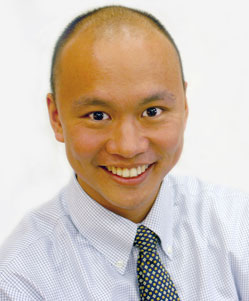|
GOLDSEA |
ASIAMS.NET |
ASIAN AMERICAN PERSONALITIES
THE 130 MOST INSPIRING ASIAN AMERICANS
OF ALL TIME
Chi Huang
PAGE 2 OF 3
“We want to form the best private school in South America,” he says. “We want to bring down Harvard Graduate School of Education people to form that school. We want it to be such a good school that ambassadors' children will attend. That would be advantageous. The tuition would fund the school.”
Huang sees a slow ripening of his work and a distant fruition.
“I want to chip away at the cycle of poverty. This might take two or three generations. We live a short time. When I'm dead, I won't be judged by awards or publications. I will be judged by the great-great-great-grandchildren of today's street children that are no longer on the street.”
To fund his work in La Paz, Huang solicits donations and works in Boston nine months out of the year, flying to La Paz several times to oversee the orphanage. Having two jobs in two hemispheres makes for long days. What powers Huang?
“He is passionate and persistent,” says Dr. Barry Zuckerman, chair of the Department of Pediatrics at the Boston University School of Medicine.
Kep James, a missionary and one of the pastors of the Iglesia La Comunidad Church, also sees the power of passion.
“Chi is incredibly passionate,” he says, “about taking care of the myriad needs of street children. He has great compassion for those on the bottom rung.”
Huang too defines his work in terms of passion.
“Medicine,” he says, “is a passion and not a job.”
Huang's passion for the impoverished seems seeded in his history.
“I grew up in Columbia, South Carolina, in Henley Homes, which was one of the housing projects” he says. “My parents are immigrants. I didn't know that we were poor, which was a testament to my parents. We moved to Texas when I was in second grade. It wasn't until third grade that I felt the difference of our poverty.
“My Mother always bought pants that were several sizes too long. She could then hem them up and let them out, section by section, as I grew. One of the boys at school made fun of me because of the lines in my pants. Those lines, where my Mother kept letting out my pants, marked the years, much like tree rings. I realized our economic difference in other ways too. I always got free lunches, while the other kids came to school with checks. At Christmas, I got socks. The other kids were given Star Wars paraphernalia. I never even saw the movie.”
Even as a child, Huang was able to pass judgment on the social conditions that produced such differences.
“I realized there was inequity,” he says. “I felt the unfairness of it and not just on a personal level. It was black and white to me then. I didn't appreciate the grays of it, the complexities of poverty. But as a child, I decided that with all the wealth in the world, children should not have to suffer.”
Ideologically precocious, young Chi had big thoughts. Today, Dr. Huang has big dreams.
“I want to build six homes for homeless children in the next six or seven years.”
CONTINUED BELOW
To achieve all that he has and all that intends, Huang has had to be flexible about sleep.
“One time he slept for 2 hours in the back of my '91 Land Cruiser,” says James. “There were 21 people crammed into the car. Chi slept like a baby, even though at least two people sat on top of him. Another time, Chi and twenty others piled into a tiny room with a wood-slat floored. Chickens and pigs lived beneath the floor. We slept on straw mats, packed like sardines. Chi decided that it would be better to sleep outside in the village square beneath a large tree. The next morning at five, several community leaders knocked on our door. They looked horrified. ‘There is a dead body under a tree in the village square,’ they said. ‘Help us come and identify it’. Everyone was relieved when it turned out to be the beloved doctor, snatching every possible second of sleep, to prepare himself for the rigors of the day, in which he attended over 200 people in the area.”
Some questioned Huang's decision to devote his life to forgotten children.
PAGE 3
Page 1 |
2 |
3
Back To Main Page
|
|
|
|

|
“There were 21 people crammed into the car. Chi slept like a baby, even though at least two people sat on top of him.”
|
CONTACT US
|
ADVERTISING INFO
© 1996-2013 Asian Media Group Inc
No part of the contents of this site may be reproduced without prior written permission.
|







